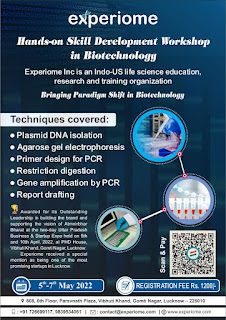Summer Internship for Biotechnology Students | Experiome
CRISPR-Cas is used to meet the requirements of Vitamin A.
The importance of nutrition is crucial to ensure healthy development and growth. Micronutrients, also known as macronutrients, are two kinds of nutrients. The requirements of macronutrients like proteins, fats, and carbohydrates are comparatively more extensive than those of micronutrients that include minerals and vitamins. When compared, if the micronutrients content in your diet is inadequate the impact will be on the child's physical and cognitive development.
Vitamin A is a lipid-soluble vitamin essential for the growth of cells and metabolism, as well as for immunological functions eye sight, as well as reproduction.It is absorbed by the duodenum and stored within the liver's stellate cells and also in adipose tissues and the pancreas, in tiny amounts. Vitamin A is naturally found in dark leafy greens fruits and vegetables with orange hues, milk products as well as liver and fish. Vitamin A intake should be approximately 200 micrograms daily for children between the ages of 1 and 5 700 micrograms a day for women and 900 micrograms per day for males.
Vitamin A deficiencies are a major cause that is a source of worry for kids living in poor countries. According to UNICEF the UNICEF, one-third of children don't receive vitamins A supplementation, and they WHO estimates that as many as 190 million preschoolers have Vitamin A deficient. Based on a survey carried out by the National Nutrition Monitoring Bureau (NNMB) approximately 60% of preschoolers in India suffer from Vitamin A deficiency. 21.5 percent have serum retinol levels less than 0.35 mg/l.
In light of this biotechnologists are attempting to increase the Vitamin Acontent through the clustered regularly interspersed small palindromic repetition (CRISPR) technique. Banana is a major economic fruit in all parts of the globe. Genetically modified plants with CRISPR-Cas' help have been considered as promising. Recently the carotene rich Cavendish Banana cultivar (cv.) Grand Naine was developed using the CRISPR/Cas9 method (AAA genome). The lycopene Epsilon-cyclase (LCYe) five exons of this gene were targeted. The specificity of the guide-RNA's design was also confirmed by its capacity to generate indels within the LCYe gene within the cv. Rasthali (AAB genome) genome. Comparing to the control (without the genome's editing) plants, the metabolic examination of the pulp of the fruit of the edited strains showed a six-fold increase in the amount of beta-carotene (24 micrograms/g). The enhancement of the taste and amount of beta-carotene in the fruit through CRISPR might be an alternative for those who suffer from Vitamin A deficiencies.
Experiome, a subsidiary of Experiome provide instruction in CRISPR-Cas vector design. We offer bioinformatics-related support in CRISPR-Cas vector design to any gene that is of interest.

Comments
Post a Comment